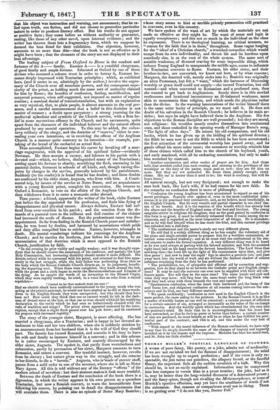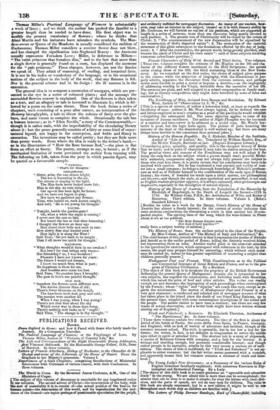THOMAS MILLER'S POETICAL LANGUAGE OP FLOWERS. A WORK of pure
fancy, like poetry, or a joke, admits not of mediocrity. If we are not ravished we feel the flatness of disappointment ; the mind has been wrought up to expect perfection ; and if the verse is only re- spectable, the jest turns out pointless, the allegory forced, or the fanciful flimsy, the expectant feels all the sudden revulsion of a balk. Why this should be, is not so easily explained. Information may be compressed into less compass in verses than in a prose treatise; the joke, bad as it is, may be better than the long-winded discourse of a determined proser ; and the fancy-piece, though not rivalling the Metamorphoses, or some of Herrick's sportive effusions, may yet have the semblance of worth if not the substance. But reasons or comparisons avail not in liking. There is no getting over "I do not like you, Doctor Fell." Thomas Miller's Poetical Language of Plomert is ottbetantitilly a work of fancy ; and we think the author has pushed the fanciful to a greater length than he needed to have done. His first object was to modify the present vocabulary of flowers ; where he thinks that Aime Martin and his imitators have mistaken the symbols. The Mea- dow-sweet or Queen of the Meadows is usually considered the emblem of 1.7selessness; Thomas Miller considers a sweeter flower does not blow, and has changed the signification into Neglected Beauty : the Anemone 'Usually represents Forsaken Love ; Miller, in deference to Milton- " The rathe primrose that forsaken dies," and to the fact that more than a single flower is generally found on a stem, has displaced the anemone for the "pale primrose." These changes, however, are not the fancies we speak of. They admit of reasoning, 4:4' reading, and botanical facts. It is not in his index or vocabulary of the language, or in his occasional notices of the subject in the body of the work, that any flatness is felt. Nor is the general scheme bad in its design : the ill success is in the execution.
The general idea is to compose a succession of nosegays, which are pre- sented to the eye in a series of coloured plates ; and the message the assembled flowers convey is explained. One of the flowers is then taken ALB a text, and an allegory or tale is invented to illustrate it; which is fol- lowed by a poem on the same theme. Thus the book forms a series of Chapters, each consisting of a posy after nature, an interpretation of the florcerff hieroglyphic, a tale to throw the colours of fancy over the pie- ture, and some verses to oomplete the whole. Occasionally the tale has a human interest ; as in "Ellen Neville," a story of the Commonwealth,— though it is rather stale, with the improbability of the circulating library ,about it : but the prose generally consists of a fairy or some kind of super- 'natural legend, not happy in the conception, and feeble and flimsy in execution. The inventions may be called pretty; but they are little more than pretty words. Even where the idea is ready to the writer's hand,— as in the illustration of "How the Rose became Red,"—the piece is flat 'frem an effort at finery. The poetry, strange to say, is better ; as if the mechanical limitation of verse prevented the author from running wild. The following on Life, taken from the posy in which pansies figure, may be quoted as a favourable sample.
"PANSIES.
That's for thoughts.' CHILDHOOD.
"Sister, arise, the sun shines bright,
The bee is humming in the air, The stream is singing in the light,
The May-buds never looked more fair; Blue is the aky, no rain today; Get up—it l,as been light for hours; And we have not begun to play,
Nor have we gathered any flowers. Time, who looked on, each accent caught, And said, He is too young for thought.'
YOUTH.
"Tonight, beside the garden-gate? Oh, what a while the night is coming ! I never saw the sun so late, Nor beard the bee at this time humming ! I thought the flowers an hour ago Had dosed their bells and sunk to test: Mow slowly flies that hooded crow!
Mow light it is along the West! Said Time, ' He yet hsah to be taught That I oft move too quick for thought.'
--stswitocm.
" What thoughts would'st thoa in me awaken?
Not love? for that brings only tears—
Nor friendship? no, I was forsaken !
Pleasure I have not known for years: The future I would not foresee, I know too much fibril what is past;
No happiness is there for me,
And troubles ever come too fast.
Said Time, No comfort have I brought; The past to hum's one painful thought.'
OLD AGE.
"Somehow the flowers seem different now, The daisies dimmer than of old; There's fewer blossoms on the bough, The hawthorn buds look grey and cold; The pansies wore another die When I was young, when I was young ! There's not that blue about the sky Which every way in those days hung. There's nothing now looks as it ought.' Said Time, 'The change is in thy thought.'"



























 Previous page
Previous page